Ellen and Jim Have a Blog, Too
We are two part-time academics. Ellen teaches in the English department and Jim in the IT program at George Mason University.


_The Pallisers_, 3:5: The back story about male outcasts · 23 November 07
Dear Harriet,
Another set of working notes towards a book or essay on the 1974 BBC film adaptation of Anthony Trollope’s Palliser or Parliamentary novels, The Pallisers, screenplays Simon Raven, director Hugh David, producer Martin Lisemore. From here on in I’ll order them more clearly: first I’ll provide a more concise thematic comparative analysis of the part, then a summary of the episodes in the part; and finally, place this matter drawn from the plays themselves in further thematic and comparative perspectives. I’ll intersperse stills as appropriate. Two days ago I put a revised concise summary of the Palliser films, 1:1 through 2:4. In a blog later this week I’ll provide transcripts of three scenes with accompanying stills from 3:5.
So first a concise analysis:
Volume 3, Part 5. Raven has a real problem with this episode because he is forced to blacken George in order to remain faithful to the crucial scenes (or hinge-points) and ending of Trollope’s CYFH?.
The front story stays mostly with Trollope and is about decisions: one episode is called “The Decision.” In Raven’s fifth part Lady Glen confirms her decision not to flee with Burgo in three separate scenes (two with Plantagenet and one with Burgo, Alice nearby). Once his grandfather’s will is read, George Vavasour decides he cannot run for office, and to travel far away to escape his creditors. In the second scene with Lady Glen, Plantagenet Palliser decides to forgo the office of Chancellor of Exchequer in order to protect his wife from her impulse to go live with Burgo Fitzgerald; and in a scene not in Trollope but very important to the film adaptation cycle as a whole, Plantagenet Palliser defies the Duke of Omnium’s scorn and pressure on him not to take his wife’s needs seriously and says he will give up the office of Exchequer and go abroad.
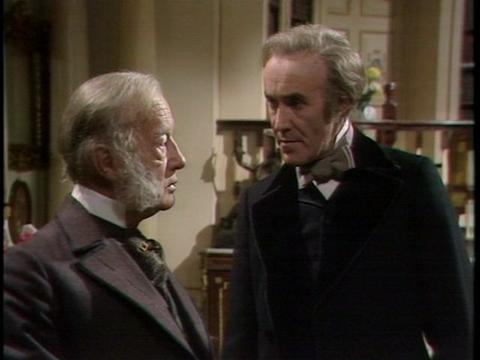
Plantagenet Palliser (Philip Latham) defies the Duke of Omnium (Roland Culver) (Pallisers BBC 1974)
This last decision is central to Raven’s conception of the whole series. His Palliser has at long last been able to throw off the blight of this ugly but rich man. Raven’s opening 5 episodes plot the education and emergence of Palliser as a decent men inside the tent and is part of this back story about the importance of money and place. Lady Glen can’t throw off what the vile aunts did to her, but only retrieve what Palliser will permit, for the last episode again brings before us the man’s limitations of vision. Alice cannot be said to decide she will break off with George, but she does refuse to help him get his grandfather’s money, and it’s that immediate ethical response that precipitates their last violent scene together and the breakup.
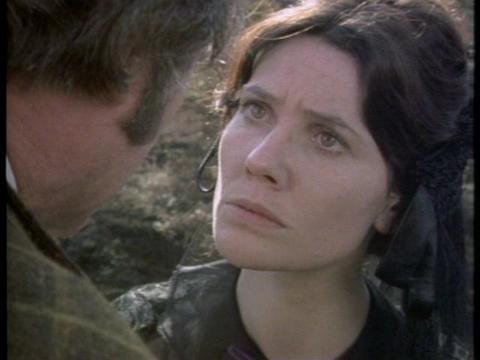
Alice Vavasour (Caroline Mortimer) defies George Vavasour (Gary Watson) on Westmorland moor
This is a crucial episode in the 26 part series. Trollope’s CYFH? is one of 6 books so 16% of Trollope’s roman fleuve; Raven treats the matter of CYFH? in 5 and 1/2 parts (there’s more to come in Part 6) so that’s nearly 25% of Raven’s film mini-series. In Trollope’s CYFH? at least as far as the plot-design and space of the book is concerned, Alice, Kate & George Vavasour’s story is central and the the Palliser story is given no more space than that of Widow Greenow (a burlesque pastoral of the themes of the other 2 threads, totally omitted by Raven). Raven makes the Pallisers so central they are almost the whole of 1:1 and the parallel is Plantagenet’s attraction to Griselda, Lady Dumbello (a different person from Trollope’s, sympathetic to his shyness and earnestness); in 1:2 Raven brings the Pallisers forward so that the Pallisers are in Switzerland with Alice, George & Kate, and Alice’s story becomes a parallel to Lady Glen’s; Burgo shows up fencing too; in 2:3 Alice decides to break with Grey not as a result of the Swiss trip, but from what she sees is the Palliser relationship at Matching Priory and the bullying of Lady Midlothian (who engineereed the Palliser match). So this decision of Lady Glen’s not to flee and stay, and Plantagenet’s hestitant attempts to create a relationship with her that can be emotionally sustaining is central to the films.
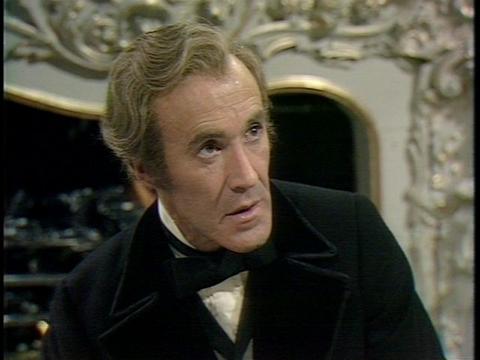
Plantagenet Palliser (Philip Latham) hearing that his wife does not & cannot love him
But Raven also cares about a back story in Trollope’s material, one he sees differently from Trollope. This story may be conceived as about two male outcasts, Burgo Fitzgerald and George Vavasour. They emerge as a pair in 1:2 and George disappears in 3:5, Burgo in 3:6. They struggled, but had the cards stacked against them and lost badly. What was their sin? They lacked the solid money Palliser inherited. In 3:5 Raven (and this not in Trollope) keeps the relationship between Burgo and George up: in Raven film, it’s George who has secured Burgo’s last bundle to take Glencora off with (in Trollope it’s the Lady Monk); Raven parallels the scenes of 3;5 so the ejection of George is twice through his going down stairs (once thrown down) and the ejection of Burgo is also through his finally chivalrously responding to Lady Glen’s tender pleas; he kisses her hand and indicates he would not harass the Lady Glencora, & leaves her up on the top of the stairs (and again we see her cry through the bars). Both forced out by a lack of money.
Both are also dismisssed cavalierly by others. When Palliser tells the Duke of St Bungay he will not take the office, Bungay does not repudiate him, and responds with generosity to Palliser but Palliser has money. (Bungay does though attempt pressure Palliser through telling the Duke of Omnium, and thus implicitly asking the Duke to pressure Palliser). George’s campaign person, to whom he has foolishly given 1500 pounds, Scruby, responds with scorn and indifference, when George announces the sane thing to do is give up contesting for the seat in Parliament, and asks for his money back; Scruby will give back only 500 pounds. The creditors are on George’s tail so he cannot stay to fight for more. In Raven George’s grandfather is only relatively rich (as in Trollope), but Raven’s old man (unlike Trollope’s), is utterly narrow dense egoistic, a tyrant-fool who lines echo the worst of the Duke of Omnium’s. Burgo has been cast off (castaway was a term used for women who fell out of the loop of respectability and protection in the Victorian era) since 1:1; only Lady Monk for vicious reasons and George out of friendship and mutual recognition will help him.
The Fifth Part’s closing scene is that of George fleeing (on the SS Ulysses, a kind joke) and showing his authentic self to a long-time and now destitute mistress, Jane. She forms a parallel to Lady Glen in this part: like the female beggar in 2:3, she is what Lady Glen could become were she to flee with Burgo.
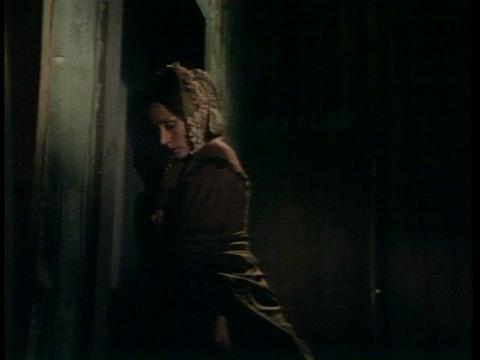
Jane (Wendy Williams) on the stairwell outside George Vavasour’s lodgings
But it’s not the female outcasts Raven cares out. Alice and Lady Glen never stray too far; the beggar girl and Jane are brought in to show what fate Alice and Lady Glen are avoiding. It’s the male ones, and in a moving attempt at subjectivity (with a use of voice-over) Plantagenet is made to appear as a potential outcast. After Plantagenet’s second scene with Lady Glen where she reiterated how she loved Burgo and did not love him, Plantagent is walking along in the street and (through the use of effective voice-over of the actress and other actors), remembering Lady Glen’s words about how she loves Burgo and does not love him, and is thinking what to do (hearing Susan Hampshire’s & Roger Livesey’s voices repeating what they said in the respective scenes). He is thinking whether he should take the offer of the Chancellor of the Exchequer after all, and he happens upon George Vavasour whom, rightly or wrongly, Raven’s Palliser respects (even in this part Raven’s Vavasour is far more decent character than Trollope’s George). George, the outcast’s words, enable Palliser to determined to cast aside his place in order to help his wife not lose hers. This is a transformation of a scene from The Last Chronicle of Barsetshire brought in: Josiah Crawley’s way of making up his mind, and he is another outcast, is made into Plantagenet’s. The letting go of this place is as important to Plantagenet as Lady Glen was to Burgo.
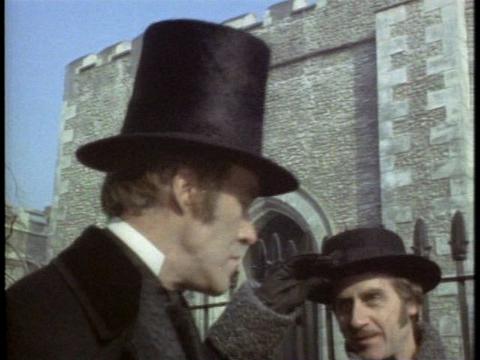
Plantagenet Palliser (Philip Latham) and George Vavasour (Gary Watson) meet in London street
It seems from this film that in order to be decent you must cut yourself off from the corrupt order (as Burgo does when he finally gives up his pursuit of Lady Glen as it is becoming harassment), but if you do & you have not the wherewithal to retrieve your decision (money, as Plantagenet has), you suffer for the rest of your life. That line or half-line is uttered in the series.
Some things to note: the scenes are tight, with continual dramatic confrontations between two characters; no extras or supernumeraries. It’s a series of clashes—I’ve discovered in many mini-series film adaptations, this one-on-one structure is often the result of the screenplay writer having to invent the scenes which don’t occur in the original books; Trollope tells, meditates, describes and dramatizes in a simple direct way much less than his readers realize. And once again, Raven is hampered somewhat by Trollope’s story for he has now to blacken George in order to make sense of hinge-points in Trollope’s novel (which he must not change or the series will not please Trollope fan audience and given reviewers something to object to), and the character as now played by Gary Watson is very unlike the finally well-meaning if worldly (amoral) man we saw in the previous episodes.
Now the summary:
Episode 21: “Love Declared”. Scene 1) It is the morning after Lady Glen refused to go off with Burgo Fitzgerald. We have a scene drawn from Trollope’s Can You Forgive Her?, Chapter 58 wherein they discuss their behavior at the party, Lady Glen tells Plantagenet that she loves Burgo Fitzgerald and does and cannot love him and that he does not love her; he is shocked, but does not appear to be enraged or overcome with sexual jealousy but rather deeply hurt at her rejection of him (which seems to be unexpected; that is he had not taken seriously her love for Burgo). He is humiliated over what has happened in public, but replies with determination that he does love her and prays she one day may love” him, coming over to her to hug and comfort her and say that his mind has been “running on other things.”
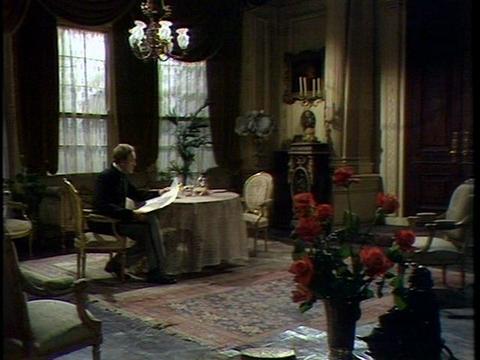
Plantagenet Palliser (Philip Latham) at breakfast awaiting Lady Glencora
Scenes 2 &3): The next scenes show Burgo and George at their club where Burgo insists Lady Glencora was about to run off with him, and may yet do so, but George warns him the money is running out, and displays anger at the disagreeable probability he will be hounded the money he, George, co-signed. In the billiard room: A letter from Alice: Squire Vavasour is dead.
Scene 4): That gothic house in Westmoreland. Angry words between George on the one hand and Alice, Kate and John Vavasour on the other: they insist on enacting what George regards as hypocritical displays of grief.
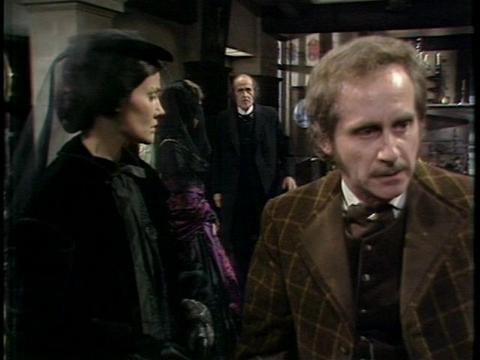
Vavasour family in Westmoreland (John, John Glyne-Jones; Alice, Caroline Mortimer; George, Gary Watson; and Kate, Karin MacCarthy)
Episode 22: “Grandfather’s Will” Scene 5): The reading of the will, disinheritance of George; money to go to John Vavasour. Scene 6): outdoors, a moor, hilly, rocky: fierce violence where Alice refuses to go along with George’s demand that she say their grandfather was not in his right mind; a heavy slap of the type that’s common from men to women in movies, and then he wrenches her arm and flees. (In Trollope’s novel Kate inherits the money; it’s Kate who goes out on the moor with George; there is no slap, only a wrenching of her arm which breaks much worse than Raven’s Alice’s where it’s made a joke of a little later. It’s no joke in Trollope.)
Scene 7): a continuation on another day of Plantagenet and Lady Glen’s candid talk about the state of their marriage and feelings. In this one he says it is a misfortune if she cannot love him, but he does love her and asks her to try to love him, and offers to go abroad. (This scene and Scene 1 (Episode 21) are both taken from Ch 58, CYFH?) In both scenes Lady Glen presents herself as unworthy of her husband, as Alice will say she is unworthy of John Grey in hers: I don’t know if this is meant to be an imitation of a Victorian trope (women do berate themselves this way in Victorian novels, and it’s not clear if at the time this was a way of talking some people understand as an acceptable way of escaping a man while not offending him, and an unexamined way of talking, or a reflection of women’s self-image at the time). Bungay arrives, at first Palliser will not see him, but Lady Glen says he must and take the position; he does not take it.
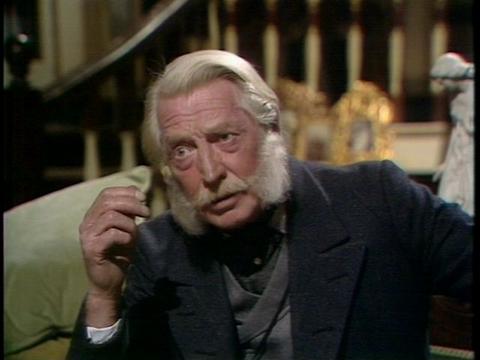
The Duke of St. Bungay (Roger Livesey) in a later scene telling the Duke of Omnium his nephew has refused a powerful office
Episode 23: “The Decision”. (Really several decisions.) Scene 8): George at Scruby’s office, to tell him he will not run for office and to ask for his 1500 back; he can get only 500, and Scruby in return also shows a lack of respect for George as well as mischievously telling him the money he had used was not from Alice, but from someone called J.G. (Gordon Gostelow is brilliant in this role throughout: never making eye-contact unless absolutely necessary, a past master at pressure and fleecing someone for money though never admitting what he’s doing, quite. His view of George is George knows the “world’s” view—we’ve heard this from Dolly Longestaffe and Barrington Erle’s dismissive suspicions in a previous part.)
Scene 9: the London street, a poor woman selling flowers, Palliser passes by and the scene is reminiscent of George Housman Thomas’s illustrations of Josiah Crawley in Last Chronicle of Barset: in his long dark coat and postures (slightly bent, thin, anguished) Philip Latham recalls Housman’s earlier drawings. (Raven is well-read in Trollope; a thorough Trollopian.) A voice over: we hear the voices of Lady Glen, Bungay, and Lady Glen as Palliser hears the painful words of how she doesn’t love him, how politics is his life, and Bungay’s amazement: “Decline it! Decline to become Chancellor of the Exchequer?” George crosses him, and makes a heart-felt comment about how you must fix your own house before you try to fix others affects Palliser’s decision to do what he already wanted to do. Here Raven is imitating a scene from Last Chronicle where Josiah Crawley comes across a working man who says “Dogged as does it” and gives other advice which enable Crawley to do what he already wanted to do (maintain his stance), Raven is transposing a scene from Last Chronicle. Scene 10) In front of Parliament’s chambers, Bungay tells Palliser he accepts Palliser’s decision, but in Scene 11), Bungay turns up in the Duke of Omnium’s sitting room to tell him his nephew is declining the offered position (Bungay means to put pressure on Palliser through alerting the Duke to what is lost and that something important may be going wrong—this is how outsiders may behave in such a situation)
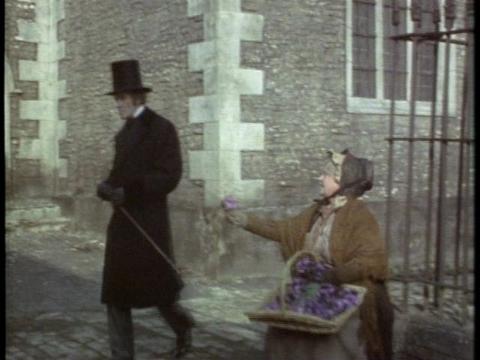
Plantagenet Palliser (Philip Latham) looking like Housman’s drawing of Josiah Crawley (Last Chronicle of Barset)
Scene 12) Alice’s drawing room: Grey comes to Alice and the openly tender vulnerable man of the previous parts is here again (Trollope’s Grey is much more controlled and much more aggressive about what he intends for Alice and him for life), offering himself once again—now that he’s heard George is in “bad trouble,” vanished from his club, about to be hounded by “a score of creditors” if he doesn’t run for office and achieve it. Neither seems to care much about George; Alice says she cannot forgive herself for what she has done (thus explaining to viewers the title of the first novel) and John Grey tells her she needs to look “away from herself” and “look to me!” When she says “this is painful,” he does not pursue it, and this is felt to be kind. In comes John Vavasour and when he sees Grey leave and hears Alice has not agreed to renew her engagement with Grey, he tells her of the money Grey supplied; the episode ends on a close up of Alice’s face.
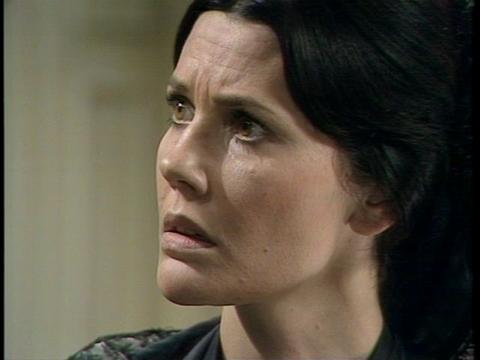
Alice Vavasour (Caroline Mortimer) told by her father
Episode 24: “Truth Discovered”. Scenes 13 & 14) Grey’s lodging room & then the stairwell. George attacks John Grey in Grey’s London lodgings with a whip; George insults & tries to strangle Grey; Grey prevents this & hurls George down the stairs. The source for this single scene are 2 scenes in CYFH?, Chs 52 & 72, here conflated & in lieu of the pistol Trollope has his now very dangerous character bring, Raven’s George brings only the whip.
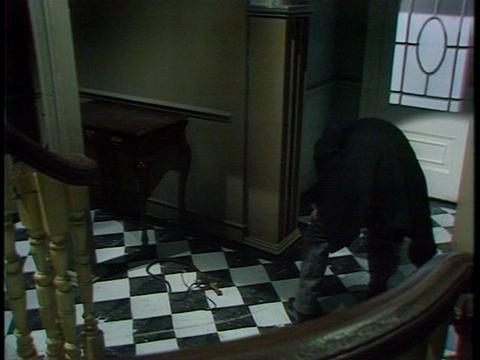
George Vavasour (Gary Watson) thrown out
Scene 15) Alice’s drawing room in her London place: her father further pressures her to marry Grey; Lady Glen comes in to tell Alice of all that occurred at Lady Monk’s ball and her and Plantagenet’s plan to go abroad; of how Palliser is showing a real love for Lady Glen in this; Alice invited and accepts. Scene 15) Duke of Omnium’s sitting room: here where on previous occasions Palliser succumbed to pressure, let Griselda, Lady Dumbello go, agreed to marry a woman he instinctively showed his utter incompatibility with; now he stands up against his uncle’s jeering, and pressure. The Duke uses ugly language to urge Palliser to impregnate Lady Glen when Palliser says he prays she will conceive; the Duke says “keep on praying” over and over in a way that makes it become you need to keep on “fucking.” Palliser has a look of controlled distaste on his face but also much relief and clearly is empowered by his refusal to kowtow. From the viewpoint of Epsodes 1-5, the worm turns; we are seeing an important stage in the Education of Plantagenet Palliser, honorable gentleman.
Scenes 17-26) various rooms, to wit, the vestibule, hall, & stairwell in the the Palliser house in London, 25 Park Lane: Lady Glen and Alice packing, large heavy old trunks and cases everywhere; they go upstairs to Plantagenet in his study and he says he will go to the house one last time (Lady Glen tells Alice this is his tenth last visit), leaving them a carefully-worked out itinerary which Alice proceeds to study. Lady Glen in a reverie about her continued yearning for Burgo; Plantagenet downstairs going out meets Burgo at front door, and allows him to pass; Burgo upstairs and a terrifically powerful scene between the two ensues: they weep, they clutch each other, the camera moves back and forth. This is their last chance, but although she says she has loved him, she does not yield at key moments, and at last (with Alice’s urging and his saying to Alice, no, he does not see they are doing anything wrong, no they should not be overthrown this way. But he relents his pursuit (“Cora! I’ll never force …”).
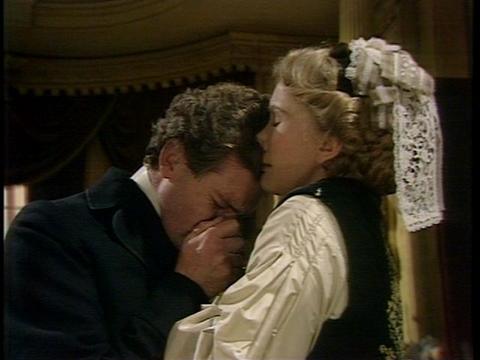
Burgo Fitzgerald (Barry Justice) and Lady Glencora Palliser (Susan Hampshire) saying goodbye
The last scene of this episode has Alice standing by the wall in the dark relieved, but Lady Glen is deeply overwrought by the emotional scene and ends up weeping by the stairway bars. A male outcast. This agon by the stairs is a repeat of a scene at the end of 1:1 and in the middle of 2:3 (her at the barred window).
Episode 25. “Leaving Town.” Scenes 28-30: George’s two lodging rooms, and the very dark poor stairwell outside. Now the other male outcast’s goodbye scene with his love: Jane, his long-time mistress. The stairwell in the Palliser house is well-lit, beautifully carved, handsomely gilded. The stairwell outside Grey’s lodging room is functional and lit. I will provide a transcript of this one: it’s a transformation of Ch 71 of CYFH?. Raven’s George is suddenly cold, hard and desperate and has no time for a leisured kind of talk (as also Trollope’s Burgo had leisured ways when he helped the female beggar in the tavern so Trollope’s George is more at his ease, not running away but waiting till morning, and more humane and and thoughtful). Raven’s George seems more authentic and with less posturing than we’ve seen him before, no flowery language. He needs no mask with her (as he has had with Alice in paying lip service to mores he’d like to think he believes in. she comes to him because she’s destitute and he mocks her by suggesting she take up prostitution; Trollope says his Jane loves George and she leaves him gently without demanding money; Raven’s Jane has long ago given up on any soft emotions. As I suggested above, Raven blackens George’s character in this part considerably. There is a joke which suggests Raven’s empathy and sense of George as a thwarted hero: the ticket he writes for his address is a ship, the SS Ulysses. Odysseus. Are we to think he survives after all?
Scenes 31-32: The gambling rooms at Basle. The great merit of this scene is how Raven emphasizes for us the incompatibility of this couple, how they cannot find pleasures together, and how despite the best intentions daily life remains a struggle of misunderstanding, sudden sharp assertions and quarrels, and unhappiness. No falseness here. It’s taken from the end of Ch 68. Both Raven’s and Trollope’s Plantagenet just cannot tolerate any degrading demeaning behavior, and for their Lady Glen that’s excitement, fun; she has not high taste for concerts or pictures. In book & film he blames Alice & she defies him.
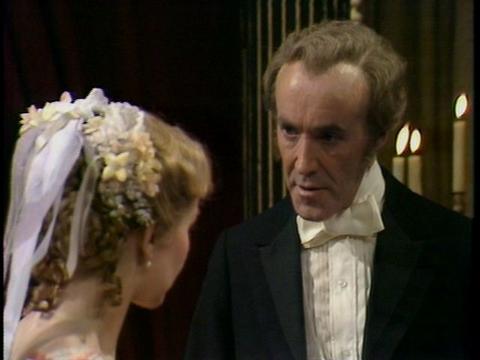
Plantagenet Pallisers (Philip Latham) telling Lady Glencora (Susan Hampshire) her grambling is degrading
**********
Further thoughts:
In CYFH?, the novel, Trollope does not stress the incompatibility of Palliser and Glencora. He fdoes not really believe such things matter. Trollope’s own marriage was not to a compatible woman (and his young manhood while sexually adult as a Victorian adult male, was not one where he grew close to any woman of his own class the way a man might today), and when he tells of why Glencora is unhappy, he says the Duke is not tender enough, doesn’t coddle her and say loving things, and had the Duke done so, & Glencora gotten pregnant (this is not presented in the crude ugly way of Raven’s duke), Glencora would have forgotten Burgo after a while. Raven presents Plantagenet and Glencorra as incompatible, writes extra scenes to show a clash in temperament and values: he is stubborn and dense and cannot listen to her; she cannot appreciate his deeper finer self, doesn’t understand this (this latter idea is in Trollope). Trollope’s portrayal of the pair is a portrayal of personalities, not grounds for real unhappiness the way Raven wants us to see, not grounds for condemning this social order. Trollope is hard on Lady Glen; he does not idealize her the way some readers have. For example, Chapter 69 (“From Baden to Lucerne,” Raven’s choice for the last scene of 3:5), Trollope writes “she had ever loved Burgo Fitzgerald as Alice Vavasour had loved Mr. Grey … She knew Burgo Fitzgerald to be a scrapegrace, and she liked him the better on that account. She despised her husband because he had no vices.” Trollope’s Lady Glen is incapable of depths of feeling. Raven’s script infantilizes Lady Glen but does not deny her the capacity to love another and want real companionship with a man.
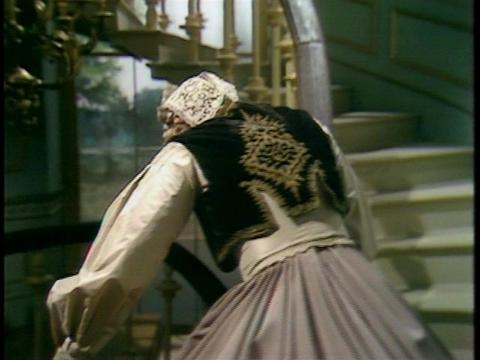
Lady Glencora Palliser (Susan Hampshire) bent over in grief & watching Burgo going down the stairs
Trollope’s idea is women want a wild partner and thus Lady Glen is a bored, not the deeper notion of a relationship which is a modern one. Partly this is the result of what he experienced in marriage.
In this Raven is the modern person who looks to companionship in partnership (=marriage). Trollope does regard marriage as a sex bargain for the man, babies for the woman, exchange of property and looks upon love as a delusion (That’s in Trollope’s Proustian_Ayala_.) Neither Raven nor Trollope try to delve this idea that women are bored by dull men; they do not see that the social arrangements as set up are actually there to prevent worse cruelties that could ensue, though it is clear that Lady Glen and Alice are lucky to have the men they end up with; they could have fared much much worse.
It seems to me that in Raven’s films (1:2-3:5) the election story and character of Scruby replaces the philistine mock-love story of Widow Greenow. Where we have scenes of the Widow Greenow alternating with Lady Glen or Alice’s story, so in Raven’s these latter two alternate with George and Scruby (or Grimes). And he’s a corrupt gouging money-soaker-up. A liar. Here we see the underbelly of the politics. Raven is at once more cynical than Trollope (who believes in his system) and more determined to present a critique of the social order which shows it to be based on sordid and ruthless manipulation. This too shows up how George is a much more important presence for Raven than he is for Trollope.
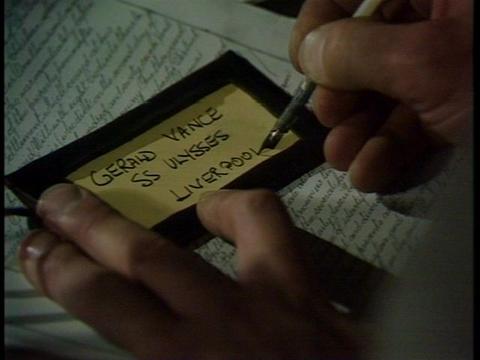
Self-reflexive joke: George’s ticket marked SS Ulysses
Well, Harriet tomorrow night, I’ll move onto watching and then studying 3:6, and in the meantime on the blog provide transcripts of George and Jane (Ch 71, “Showing How George Vavasour Received a Visit”), as well as the two scenes between Plantagenet and Lady Glen (drawn from Chs 58-59, “The Pallisers at Breakfast”).
Sylvia
--
Posted by: Ellen
* * *
Comment
commenting closed for this article
